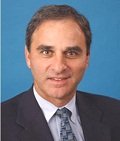Nuclear engineering professor takes fellowship at State Department
Gilbert Brown, a professor of Nuclear Engineering at the University of Massachusetts Lowell and a long-time member of the American Nuclear Society, has started a year-long fellowship at the U.S. Department of State, in Washington, D.C. The William C. Foster Fellows Visiting Scholars Program was established by Congress in 1983 and gives specialists in the physical sciences an opportunity to use their expertise in support of the arms control, nonproliferation, and disarmament activities of the State Department.
Brown's position is in the Office of Nuclear Energy, Safety and Security (NESS) in the Bureau of International Security and Nonproliferation (ISN). NESS is responsible for negotiating agreements for peaceful nuclear cooperation that provide the legal underpinning for the export of U.S. nuclear reactors and fuel. The office is also responsible for developing policy, negotiating and coordinating multi- and bilateral nuclear cooperation, establishing multilateral export controls, and providing for the diplomatic aspects of reactor safety as well as the physical security of nuclear materials and facilities. Brown said that he looks forward to an interesting and productive year at the State Department and that he is glad to be in a position to affect and support the diplomatic efforts of the United States toward peaceful nuclear cooperation throughout the world.
In his year-long position, Brown will collaborate with other government offices and with industry and universities to help compile an overview of U.S. education and training program options for countries that are developing nuclear energy. This effort should enhance the ability to market U.S. nuclear technology overseas. The principal goal is to build human resource development partnerships with other countries to help them develop an indigenous work force that has the same level of knowledge, skills, and safety culture that is the hallmark of the nuclear industry in the United States.
Brown's entire career has prepared him for this position. As a nuclear engineering professor, he has worked in several areas, including fast and thermal reactor safety. He has also held assignments in safeguards training at the International Atomic Energy Agency and was involved with the formation of the World Nuclear University Summer Institute. In addition, he has served on the independent National Nuclear Accrediting Board, which accredits individual utility training programs, and has been a member of the board of directors of ABET, which accredits academic programs.
He has also worked with community colleges and utilities in developing and deploying a uniform nuclear curriculum program that addresses the need for well-qualified nuclear plant workers. Brown is past chair and current treasurer of the Nuclear Engineering Department Head Organization and he is a Fellow of ANS, where he has been a member since graduate school and has maintained involvement in ANS affairs for more than 40 years.
Brown understands the need for robust education and training programs to sustain the growing nuclear industry both in the United States and abroad. He has been at the State Department for just over a month, but he has already learned a great deal and has participated in collaborative meetings with other government offices and industry, he said. Brown hopes to contribute to the department through his expertise in nuclear education and training, and he also looks to gain real world and international experience to bring back to his university and students.
The nuclear community greatly benefits from placing professionals such as Brown in fellowship positions within the government. Not only do they offer valuable expertise, but they also bring visibility to the nuclear field. Brown encourages ANS members to become more involved in national and international nuclear issues by considering these types of opportunities, which are available to students and to young and experienced professionals. Capitol Hill would benefit from having more nuclear engineers around!
_____________
Lenka Kollar is a master's student in nuclear engineering at Purdue University. She has been involved in Purdue's ANS student chapter since 2006, and has been a national ANS member since 2009. At Purdue, Lenka established an extensive local nuclear science outreach program, including visits to high schools and a teacher workshop. She is also a member of the ANS Student Sections Committee. Lenka plans to graduate in May 2012 and is looking to start a career in nuclear energy policy and communications, preferably in the Chicago area.





